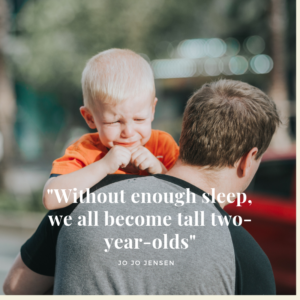Learning to Sleep – Insomnia on the Rise?

I can vaguely remember sitting in a high school science lecture, with my biology teacher explaining the importance of sleep (especially in our youth). How as you age, your body doesn’t invest that same amount of time in sleep because the repairs and recharges that happen are no longer as crucial as they would be to the younger generation. I distinctly (and ignorantly) remember laughing with friends at the idea of our bodies not caring about us when we become elderly, much like a society that often takes this same disregard for experience.
When I search for science to back up this memory – it’s not really there. Meaning most likely that I misunderstood the original lesson, or perhaps the explanation from my teacher was not as well expressed as they might have liked.
Web MD diffuses the myth that we need less sleep as we age. They assert that “adults require about the same amount of sleep from their 20s into old age”.
Regardless, what I’ve come to find with age is that the pattern holds true. As we age – we get less sleep. Worse than this is as we age, instances of insomnia increase dramatically. In Canada, it’s estimated that about one in seven Canadians have problems going to sleep or staying asleep.
Lack of sleep in our aging populations is more likely attributed to health issues (e.g. sleep apnea, body aches and pains that cause one to stir in the night, etc.), sleep cycles and circadian rhythms, the effects of different medications, and the death of particular neurons.
Being able to define the problem and pin point the aggravating factor that creates your individual sleep issues can be a life-long battle. I have sat with many of my friends recently and heard stories of the nights they lay awake, only to have to somehow find a way to struggle through work the next day with barely an hour of rest.
Retraining your brain to sleep is an uphill battle, but it can be done.
Kate Edgley with The Guardian explores the numerous ways she learned how to recover from her bouts of insomnia: affirmations, reprograming (“Your body must learn … that bed is for sleep and sex only”), avoiding clock-watching, exercise, etc. The change was not instantaneous, but one that took place over the course of 11 months of hard work and determination.
The Harvard Men’s Health Watch (unsurprisingly) offers a very formulaic approach to sleep improvement:
- Talk to your doctor
- Consider the use of a sleep aid
- Consider Cognitive Behavioural Therapy (a better long-term solution than pills)
- Ensure you employ good sleeping habits (consistent bedtimes, avoid naps, exercise daily, get out of the bed if you can’t sleep for 20 minutes and do something, etc).
If you’re one who enjoys the idea of a “quick-fix scheme” these methods might be worth giving a try. I personally have heard of many people who employ the 4-7-8 breathing cycle as a way to reset their system when anxious, so it doesn’t surprise me others are using it as a sleep aid.
The best advice you can get is to not be too hard on yourself. Don’t count the minutes of sleep you are losing. Keeping looking for different strategies and methods that help ease your personal sleep challenges. Consult professionals and be open to therapies that may be different from the traditional methods you would seek out.
Best wishes on your quest for a restful night of sleep.
Sweet Dreams!
Leave a Reply

